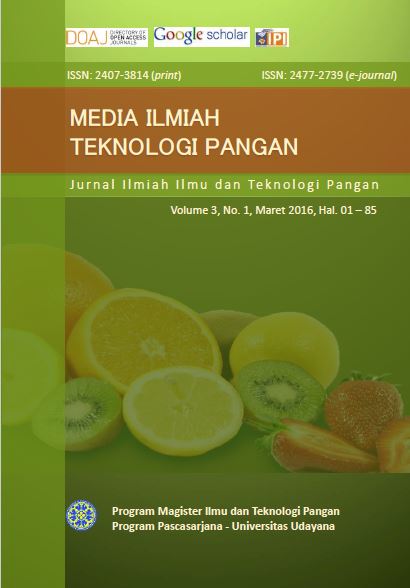Viability of Lactic Acid Bacteria Isolated from Kombucha Tea Against Low pH and Bile Salt
Abstract
Kombucha tea is a functional drink fermented by various types of microbes. Kombucha tea is also a source of lactic acid bacteria that can maintain the balance of the microflora of the digestive tract which can improve the health of the human body. Lactic acid bacteria can act as a probiotic if it is able to survive to the human gastrointestinal tract, where in order to reach the digestive tract, lactic acid bacteria has to be resistant to the low pH in the stomach and bile salts. The purpose of this study was to determine the level of resistance of lactic acid bacteria in kombucha tea against low pH and bile salts. This study uses 20 isolates, each of these isolates were tested to the resistance of low pH 2.0 and 0.5 % bile salts with incubation time of 4 hours. The results indicated that from 20 isolates of lactic acid bacteria that were obtained from kombucha tea, 15 isolates were resistant to low pH and 13 isolates were resistant to bile salts. The isolates have a huge potential to be developed as a probiotic candidate that can contribute greatly to the health of the digestive tract.Downloads
Download data is not yet available.
References
Arihantana, N.M.I.H., dana N.N.Puspawati. 2015. Potensi BAL Kandidat Probiotik yang Diisolasii dari Minuman ungsional The Kombucha. Laporan Hasil Penelitian. Hibah Unggulan Program Studi. Universitas Udayana. Unpublish.
Bridson, E.Y. 1998. The Oxoid Manual. 8th. Ed. Basingstoke: Unipath Limited. p. 3-16.
Chou LS, Weimer B. 1999. Isolation and Characterization of Acid and Bile Tolerant Isolates from Strains of Lactobacillus acidophilus. J Dairy Sci 82:23-31.
Fontana, J.D., V.C. Franco, S.J. deSouza, I.N. Lyra and M. deSouza. 1990. Nature of Plant Stimulators In The Production of Acetobater xylinum (”Tea Fungus) Biofilm Used In Skin Therapy. Appl. Biochem and Biotechnology.
Groff, J.L. dan Gropper, S.S. 2001. Advanced Nutrition and Human Metabolism. Wadsworth, Canada.
Hayakawa,K. 1992. Classification and Action of Food Microorganism. Di dalam: Nakazawa, Y. dan A. Hosono (eds). Function of Fermented Milk: Challenges for teh health science, p 127. Elsevier Science Publisher Ltd.
Jacobsen, C. N. 1999. Screening of Probiotics Activities of Forty-Seven Strains of Lactobacillus spp by In Vitro Techniques and Evaluation the Colonization of Five Selected Strains in Humans. J. Appl and Environ Microbial 65(11): 4949-4959.
Kimoto,H., S.Ohmomo, T. Okamoto. 2002. Enhancement of Bile Tolerance in Lactococci by Tween 80. J. of Applied Microbiology. 92: 41-46.
Moser,S.A. dan Savage,D.C. 2001. Bile Salt Hydrolase Activity and Resistance to Toxicity of Conjugated Bile Salt are Unrelated Properties in Lactobacilli. J Appl and Environ Microbial p:3476-3480.
Naland, H. 2004. Kombucha: Teh Ajaib Pencegah dan Penyembuh Aneka Penyakit. Penerbit Agromedia Pustaka. Jakarta.
Ngatirah, Harmayani E, Rahayu ES, Tyas Utami. 2000. Seleksi Bakteri Asam Laktat sebagai Agensia Probiotik yang Berpotensi Menurunkan Kolesterol. Seminar Nasional Industri Pangan. PATPI. 2000. Surabaya 10 – 11 Oktober 2000.
Puspawati, N.N., 2008. Penggunaan Berbagai Jenis Bahan Pelindung untuk Mempertahankan Viabilitas Bakteri Asam Laktat yang Diisolasi Dari Air Susu Ibu (ASI) pada Proses Pengeringan Beku dan Penyimpanan. Tesis. Program Studi Ilmu Pangan, Institut Pertanian Bogor.
Shortt C. 1999. The Probiotic Century: Historical and Current Perspectives. Review Trends Food Science and Tech. 10:411-417.
Surono, I.S., 1998. Peranan Bakteri Asam Laktat Asal Indonesia sebagai Antimutagen. Majalah Ilmiah: Widya, Feb. 1998/No 149, th XV, hal 55 – 59.
Bridson, E.Y. 1998. The Oxoid Manual. 8th. Ed. Basingstoke: Unipath Limited. p. 3-16.
Chou LS, Weimer B. 1999. Isolation and Characterization of Acid and Bile Tolerant Isolates from Strains of Lactobacillus acidophilus. J Dairy Sci 82:23-31.
Fontana, J.D., V.C. Franco, S.J. deSouza, I.N. Lyra and M. deSouza. 1990. Nature of Plant Stimulators In The Production of Acetobater xylinum (”Tea Fungus) Biofilm Used In Skin Therapy. Appl. Biochem and Biotechnology.
Groff, J.L. dan Gropper, S.S. 2001. Advanced Nutrition and Human Metabolism. Wadsworth, Canada.
Hayakawa,K. 1992. Classification and Action of Food Microorganism. Di dalam: Nakazawa, Y. dan A. Hosono (eds). Function of Fermented Milk: Challenges for teh health science, p 127. Elsevier Science Publisher Ltd.
Jacobsen, C. N. 1999. Screening of Probiotics Activities of Forty-Seven Strains of Lactobacillus spp by In Vitro Techniques and Evaluation the Colonization of Five Selected Strains in Humans. J. Appl and Environ Microbial 65(11): 4949-4959.
Kimoto,H., S.Ohmomo, T. Okamoto. 2002. Enhancement of Bile Tolerance in Lactococci by Tween 80. J. of Applied Microbiology. 92: 41-46.
Moser,S.A. dan Savage,D.C. 2001. Bile Salt Hydrolase Activity and Resistance to Toxicity of Conjugated Bile Salt are Unrelated Properties in Lactobacilli. J Appl and Environ Microbial p:3476-3480.
Naland, H. 2004. Kombucha: Teh Ajaib Pencegah dan Penyembuh Aneka Penyakit. Penerbit Agromedia Pustaka. Jakarta.
Ngatirah, Harmayani E, Rahayu ES, Tyas Utami. 2000. Seleksi Bakteri Asam Laktat sebagai Agensia Probiotik yang Berpotensi Menurunkan Kolesterol. Seminar Nasional Industri Pangan. PATPI. 2000. Surabaya 10 – 11 Oktober 2000.
Puspawati, N.N., 2008. Penggunaan Berbagai Jenis Bahan Pelindung untuk Mempertahankan Viabilitas Bakteri Asam Laktat yang Diisolasi Dari Air Susu Ibu (ASI) pada Proses Pengeringan Beku dan Penyimpanan. Tesis. Program Studi Ilmu Pangan, Institut Pertanian Bogor.
Shortt C. 1999. The Probiotic Century: Historical and Current Perspectives. Review Trends Food Science and Tech. 10:411-417.
Surono, I.S., 1998. Peranan Bakteri Asam Laktat Asal Indonesia sebagai Antimutagen. Majalah Ilmiah: Widya, Feb. 1998/No 149, th XV, hal 55 – 59.
Published
2016-03-31
How to Cite
PUSPAWATI, Ni Nyoman; ARIHANTANA, Ni Made Indri Hapsari.
Viability of Lactic Acid Bacteria Isolated from Kombucha Tea Against Low pH and Bile Salt.
Media Ilmiah Teknologi Pangan (Scientific Journal of Food Technology), [S.l.], v. 3, n. 1, p. 18-25, mar. 2016.
ISSN 2477-2739.
Available at: <https://ojs.unud.ac.id/index.php/pangan/article/view/23166>. Date accessed: 04 mar. 2026.
Issue
Section
Articles
Keywords
kombucha tea; lactic acid bacteria; viability; low pH; bile salts








